-
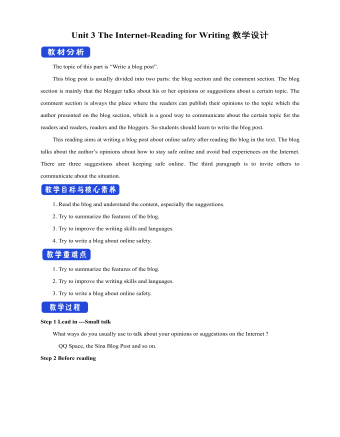
新人教版高中英语必修2Unit 3 The Internet-Reading for Writing教案二
8. However, the more polite you are, the less likely it is you will be attacked. 然而, 你越有礼貌, 你被攻击的可能性就越小。 Step 8 Writing---the articleHow to stay safe in the online chat roomToday I thought I’d blog about a question that has been asked many times--- how do you stay safe online and avoid bad experiences in the online chat room ? I’m not an expert, but many years as a blogger have taught me a thing or two.First of all, there’s the golden rule of the Internet: keep out of what makes you uneasy. Don’t post comments or click on anything. Second, protect your privacy. Don’t give out too much private information like your address, phone numbers, the ID numbers, etc. Third, be polite. If you are polite to others on the Internet, you won’t be attacked in normal situation. Finally, don’t believe in others easily and never meet someone you met online alone. It is very dangerous.Have you had any bad experiences online, or do you have some good advice for staying safe? Post your comments below!Step 9 Pair workExchange drafts with a partner. Use this checklist to help your partner revise his/her draft.1. Does the writer tell the reader what he/she know about the topic ?2. Are the tips and suggestions well organised ?3. Has the writer defined the new words ?4. Does the author include examples, comparison, or explanations ?5. Does the writer end by asking readers to leave comments and/or suggestions ?6. Can you find any grammar or spelling mistakes.Step 6 HomeworkPut up your revised draft in the classroom or read it to your class.
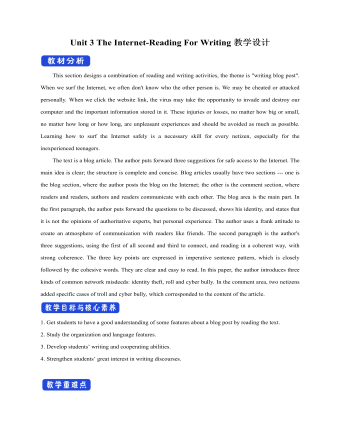
新人教版高中英语必修2Unit 3 The Internet-Reading For Writing教案一
⑦identity theft 身份盗窃⑧chat room 聊天室⑨draft your blog post 起草博客帖子⑩post embarrassing photos 张贴尴尬照片 【话题句式】 1. How do you stay safe online and avoid bad experiences on the Internet? 你如何在网上保持安全, 避免在网上的不良经历? 2. I’m not an expert, but many years as a blogger have taught me a thing or two. 我不是专家, 但作为一个博主, 我已经学了好几年了。 3. If you see or read something that makes you feel uncomfortable, leave the site immediately. 如果你看到或读到一些让你觉得不舒服的东西, 立即离开这个网站。4. Don’t give out your address or phone number. 别告诉别人你的地址或电话号码。 5. Identity theft is a common and serious problem. 身份盗窃是一个常见而严重的问题。6. Being online is no excuse for being rude, and you don’t want to become a target for a troll or cyberbully. 上网并不是无礼的借口, 你也不想成为发挑衅帖子的人或网络恶霸的目标。 7. Trolls often use several false names so that they can stay on a site. 发挑衅帖子的人经常使用几个假名, 这样他们就可以留在一个网站上。8. However, the more polite you are, the less likely it is you will be attacked. 然而, 你越有礼貌, 你被攻击的可能性就越小。
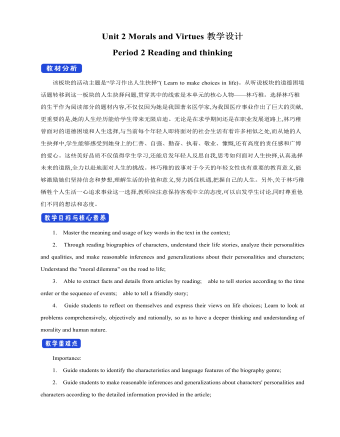
新人教版高中英语必修3Unit 2 Morals and Virtues教学设计二
Activity 41. Students complete the task of activity 4, then teachers and students check the answers. 2. The teacher organized the students to work together and asked them to use the tables and mind maps sorted out before to retold the important choices in Lin Qiaozhi's life and their resultsStep 5 Language points1. The teacher asks the students to read the text carefully, find out the core words and long and difficult sentences in the text and draw lines, understand the use of vocabulary, and analyze the structure of long and difficult sentences. 2. The teacher explains and summarizes the usage of core vocabulary and asks the students to take notes. 3. The teacher analyzes and explains the long and difficult sentences that the students don't understand, so that the students can understand them better. Step 6 Homework1. Read the text again, in-depth understanding of the text; 2. Master the use of core vocabulary and understand the long and difficult sentences. 3. Complete relevant exercises in the guide plan. 1、通过本节内容学习,学生是否理解和掌握阅读文本中的新词汇的意义与用法;2、通过本节内容学习,学生能否结合文本特点总结林巧稚的人生原则和人格品质特征;3、通过本节内容学习,学生能否针对人生抉择发表自己的看法;能否全面地、客观地、理性地看待问题,进而对道德和人性有更加深入的思考和理解。
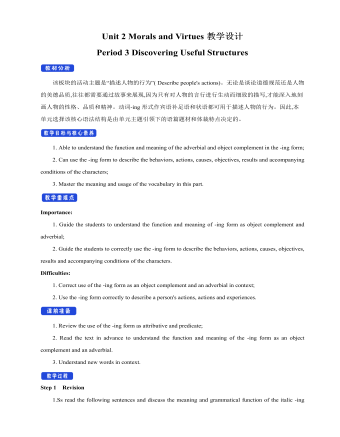
新人教版高中英语必修3Unit 2 Morals and Virtues教学设计三
The joke set her crying.这个玩笑使她哭起来。Step 5 ReadingActivity 31. Students read the small text in activity 3. The teacher provides several small questions to check whether students understand the content of the text and the ideographic function of the -ing form in the text.*Where are those people?*Why did Dr Bethune come to China?*How did he help the Chinese people during the war?*What did Chairman Mao Zedong say about him?2. Ss try to rewrite some sentences using the -ing form. Then check the answers. When checking the answers, the teacher can ask different students to read the rewritten sentences and give comments.Answers:1. he became very interested in medicine, deciding to become a doctor.2. …after hearing that many people were dying in the war.3. Helping to organise hospitals, he taught doctors and nurses, and showed people how to give first aid./ He helped to organise hospitals, teaching doctors and nurses, and showing people how to give first aid.4. …praising Dr Bethune as a hero to be remembered in China.Step 6 PracticeActivity 4Students complete grammar activities 2 and 3 on page 69 of the workbook.Step 6 Homework1. Understand and master the functions and usage of the -ing form;2. Finish the other exercises in Using structures.1、通过本节内容学习,学生是否理解和掌握动词-ing形式作宾语补足语语和状语语的功能和意义;2、通过本节内容学习,学生能否正确使用动词-ing形式描述人物的行为、动作及其经历;3、通过本节内容学习,学生能否独立完成练习册和导学案中的相关练习。
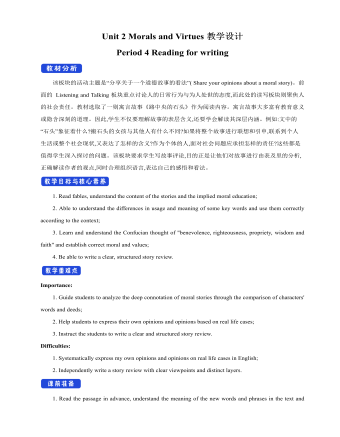
新人教版高中英语必修3Unit 2 Morals and Virtues教学设计四
3.Teachers ask different groups to report the answers to the questions and ask them to try different sentence patterns.The teacher added some sentence patterns for students to refer to when writing.Step 4 Writing taskActivity 51.Write the first draft.Students first review the evaluation criteria in activity 5, and then independently complete the draft according to the outline of activity 4, the answers to the questions listed in the group discussion and report, and the reference sentence pattern.2.Change partners.The teacher guides the students to evaluate their partner's composition according to the checklist of activity 5 and proposes Suggestions for modification.3.Finalize the draft.Based on the peer evaluation, students revise their own compositions and determine the final draft.Finally, through group recommendation, the teacher selects excellent compositions for projection display or reading aloud in class, and gives comments and Suggestions.Step 5 Showing writingActivity 5T call some Ss to share their writing.Step 6 Homework1. Read the passage in this section to better understand the passage.2. Carefully understand the hierarchical structure of the article, and deeply understand the plot of the story according to the causes, process and results;3. Independently complete the relevant exercises in the guide plan.1、通过本节内容学习,学生是否理解和掌握阅读文本中的新词汇的意义与用法;2、通过本节内容学习,学生能否通过人物言行的对比分析道德故事的深层内涵;3、通过本节内容学习,学生能否根据故事的起因、经过和结果来深入理解故事的情节,从而了解文章的层次结构;4、结合现实生活案例发表自己的见解和看法,写一篇观点明确、层次分明的故事评论。
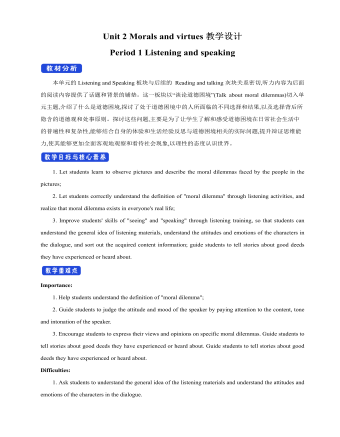
新人教版高中英语必修3Unit 2 Morals and virtues教学设计一
(2) students are divided into groups according to the requirements of activity 3. Each student shares a story of personal experience or hearing-witnessing kindness, and then selects the most touching story in the group and shares it with the whole class. Before the students share the story, the teacher can instruct them to use the words and sentence patterns in the box to express. For example, the words in the box can be classified:Time order: first of all, then, after that, later, finally logical relationship :so, however, although, butTeachers can also appropriately add some transitional language to enrich students' expression:Afterwards, afterwards, at last, in the end, eventuallySpatial order: next to, far from, on the left, in front ofOtherwise, nevertheless, as a result, therefore, furthermore, in addition, as well asSummary: in a word, in short, on the whole, to sum up, in briefStep 8 Homework1. Understand the definition of "moral dilemma" and establish a correct moral view;2. Accumulate vocabulary about attitudes and emotions in listening texts and use them to express your own views;3. Complete relevant exercises in the guide plan.1、通过本节内容学习,学生能否理解理解“道德困境”的定义;2、通过本节内容学习,学生能否通过说话人所表达的内容、说话的语气、语调等来判断其态度和情绪;3、通过本节内容学习,学生能否针对具体的道德困境发表自己的看法和见解,能否掌握听力理训练中的听力策略。
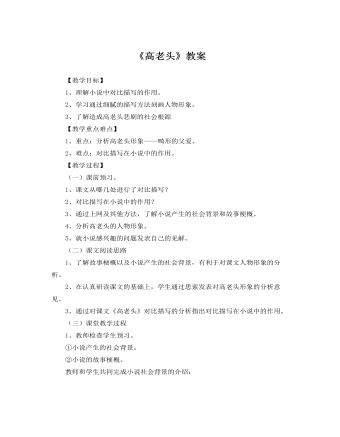
人教版高中语文必修3《高老头》教案
4、问题讨论(1)巴尔扎克小说在法国文学史上的地位?在法国文学史的地位:随着巴尔扎克在法国文坛上的如日中天,他渐渐地被他的时代的作家所认识。戈蒂耶第一个站出来热情地赞扬巴尔扎克的天才。此后乔治·桑、波德莱尔、福楼拜、左拉对他赞誉有加。雨果甚至在巴尔扎克的葬礼上说:“在最伟大的人物中间,巴尔扎克属于头等的一个,在最优秀的人物中间,巴尔扎克是出类拔萃的一个。他的才智是惊人的,不同凡响的成就,不是眼下说的尽的……”人道主义斗士法朗士对文体非常苛求,他深请地说:“他是他那个时代的社会的洞察入微的历史家。他比任何人都善于使我们更好地了解从旧制度想新制度的过度。”特别强调:“从塑造形象和深度来说,没有人能比得上巴尔扎克。”后来的作家莫洛业说:“巴尔扎克不仅仅是十九世纪的优秀作家,他堪称最伟大的小说家,这在今天几乎是一致的看法。”
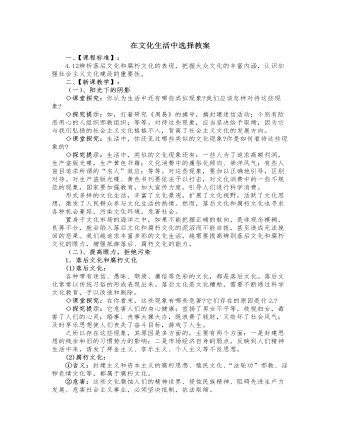
人教版高中政治必修3在文化生活中选择教案
◇小辞典:绿色阅读随着知识经济时代的到来,全球化信息浪潮正铺天盖地席卷而来。尤其足随着我国加入世贸组织由梦想变为现实,同国外进行频繁而广泛的经济文化交流,在所难免。在大量文化信息面前,就像物质生活中倡导绿色食品一样,对于精神食粮,也应该倡导绿色阅读。绿色阅读,是一种无污染的有利于人健康文明生活的阅读。文化就像大自然那种绿色带给我们永久愉悦一样,它是高科技竞争中源源不断地给我们充电的高效营养库,是一个沙漠中穿行人身心交瘁时望到的一片绿洲,是一个人葆有的、没有受到任何污染的、永远都清如许的“半亩方塘”。◇课堂练习:在我国,必须大力倡导“爱国守法、明礼诚信、团结友善、勤俭自强、敬业奉献,的基本道德规范。这些基本道德规范()①是我国社会主义文化建设的重要内容②是我国社会主义社会的重要特征③是我国社会主义道德的重要体现④是社会主义经济建设的唯一精神动力
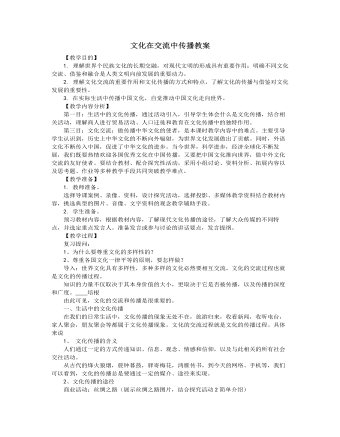
人教版高中政治必修3文化在交流中传播教案
商业活动、人口迁徙、教育活动是文化传播的主要途径。随着科学技术的不断进步,文化传播的手段也越来越多样,越来越先进。现代文化传播已经不仅限于这些,传播的媒介越来越多。经历了口语、文字、印刷、电子和网络等发展阶段。二、大众传媒:现代文化传播的手段1、 传媒:传播的媒介2、 发展:口语――文字――印刷――电子――网络3、 现代传媒包括:报刊、广播、电视、网络、杂志、书籍、手机、电子读物等各种现代传媒的作用各具特色,各有优点。(学生讨论并畅谈各自的优缺点)归纳:新的传媒的出现,并不意味着旧传媒的消失,各种传媒都在文化传播中发挥着重要的作用。传媒的真正开始面向大众传递信息,是以印刷媒体的推广为标志的。如今,依托电子技术、微电子技术、光纤通信技术、网络技术、多媒体技术等现代信息技术,大众传媒能够最大程度地穿越时空局限,汇集来自世界各地的信息,日益显示出文化传递、沟通、共享的强大功能,已经成为文化传播的主要手段。
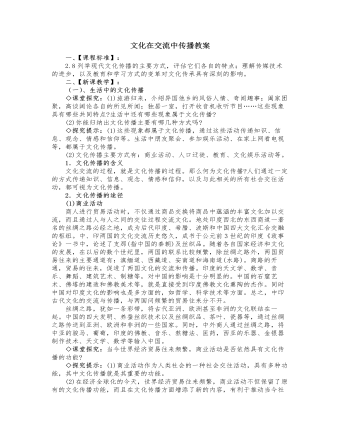
人教版高中政治必修3文化在交流中传播教案
(一)、生活中的文化传播◇课堂探究:(1)旅游归来,介绍异国他乡的风俗人情、奇闻趣事;阖家团聚,高谈阔论各自的所见所闻;独居一室,打开收音机收听节目……这些现象具有哪些共同特点?生活中还有哪些现象属于文化传播?(2)你能归纳出文化传播主要有哪几种方式吗?◇探究提示:(1)这些现象都属于文化传播,通过这些活动传递知识、信息、观念、情感和信仰等。生活中朋友聚会、参加娱乐活动、在家上网看电视等,都属于文化传播。(2)文化传播主要方式有:商业活动、人口迁徙、教育、文化娱乐活动等。1.文化传播的含义文化交流的过程,就是文化传播的过程。那么何为文化传播?人们通过一定的方式传递知识、信息、观念、情感和信仰,以及与此相关的所有社会交往活动,都可视为文化传播。
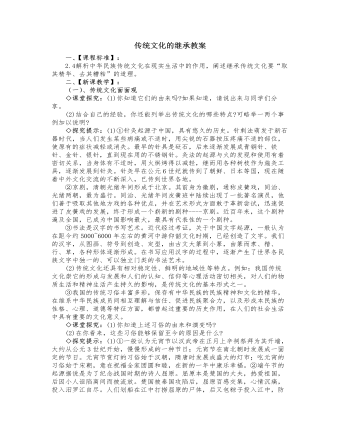
人教版高中政治必修3传统文化的继承教案
◇探究提示:传统文化对现实生活是财富还是包袱,要具体问题具体分析,不可一概而论。例如,“忠”是我国古代伦理道德的最高原则,《左传》中的“临患不忘国,忠也”,要人们尽自己最大努力,为维护国家利益而献身,是积极的,对现实生活来说就是财富,应该提倡;而宋代的“君要臣死,臣不得不死”的封建忠君思想对现实生活来说是包袱,应该抛弃。2.继承传统文化的正确态度如何继承传统文化,发挥传统文化的积极作用呢?正确的态度是:“取其精华,去其糟粕”,批判继承,古为今用。面对传统文化,要辩证地认识它们在现实生活屯的作用,分辨其中的精华和糟粕。对于传统文化中符合社会发展要求的、积极向上的内容,应该继续保持和发扬。对于传统文化中不符合社会发展要求的、落后的、腐朽的东西,必须“移风易俗”,自觉地加以改造或剔除。
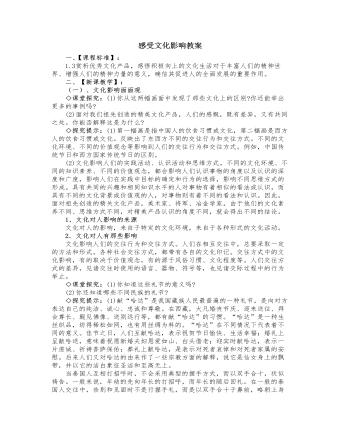
人教版高中政治必修3感受文化影响教案
世界观、人生观、价值观是人们文化素养的核心和标志。一个人的世界观、人生观、价值观是在长期的生活和学习过程中形成的,是各种文化因素交互影响的结果。世界观、人生观、价值观一经形成,就具有确定的方向性,对人的综合素质和终身发展产生深远而持久的影响。◇课堂探究:(1)你能补充一两个定居海外的华裔在生活方式和习俗方面仍然表现出受我们民族文化影响的事例吗?(2)能否谈谈你阅读这段话时的感悟,并用自己的理解说明文化对人的影响力?◇探究提示:(1)启发同学们搜集材料,了解历史上或现实生活中海外华侨的生活方式受中华民族文化影响的具体事例。(2)通过阅读这段话,可以感受到,一段丰富的人生经历、一份令人心动的情感、一种远大的理想、一种催人奋进的力量,会深深地影响着人的发展。
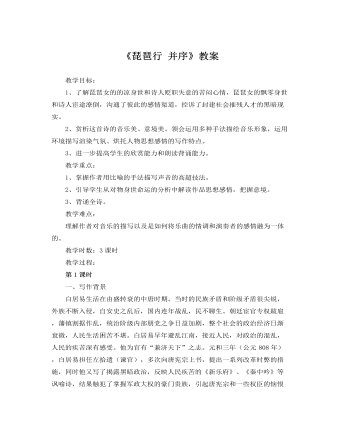
人教版高中语文必修3《琵琶行 并序》教案
9、在乐曲终了之后,诗人以“东船西舫悄无言,唯见江心秋月白”两句结尾,这两句作用如何?明确:诗人没有直接写听者的热烈反响以说明琵琶女技艺非凡和乐声的感人至深,否则过于直白就不含蓄,不含蓄也就显不出深沉了。用“东船西舫悄无言”的寂静无声,反衬“有声”的音乐效果,可谓“此时无声胜有声”了。人们无声地沉浸、陶醉在艺术的享受之中,那深深打动人的乐声仿佛缭绕迂回耳际,不由得使诗人想到了自己浩茫的心事,引起情绪上的波澜。在这片刻的沉寂中,只见一轮迷蒙的冷月荡漾在江心的微波之中,它提醒诗人从乐声中回到现实中来。这句景物描写点染烘托了浓重的氛围,与复杂的乐声融为一体,共同表现了琵琶女与诗人息息相通的复杂情感,是那么的忧愤、哀怨凄楚、苍凉,给整个音乐形象补足了画龙点睛之笔。
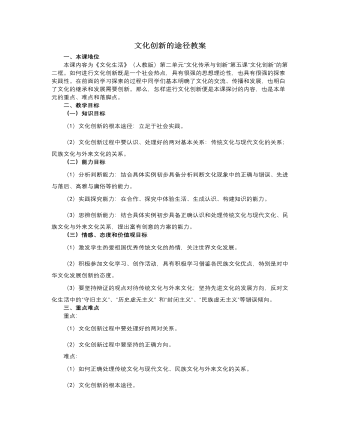
人教版高中政治必修3文化创新的途径教案
这次大赛我们看到了启发讲授式,合作探究式,情景体验式,信息技术与学科教学整合式等多种教学方法,各有所长,也都发挥了各自不同的教学作用。重庆的李静老师在讲《文化创新的途径》这课中,从一个大家都非常关注的有些争议的张艺谋导演的雅典奥运会闭幕式上8分钟的表演的品评与思辩入手,学生非常兴奋,又到2008年北京奥运会开幕式的点火和文艺演出的创新设计,教学过程中既有学生的现场调查,又有充分发挥学生想象力的小组合作探究,还有小组间彼此的评价。在教学方式的设计上既有体验式,又有合作探究式,还有教师的启发讲授,多种教学方式的整合提高了课堂教学的整体效益。最后还要求学生把他们的设计通过E-mail等方式发给北京奥运会组委会,让学生非常兴奋。”
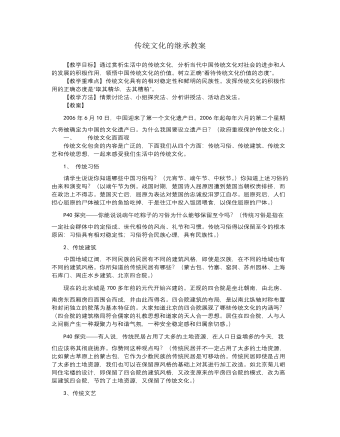
人教版高中政治必修3传统文化的继承教案
思考:在我们今天的生活中,应该如何认识“孝”道?(“孝”为中华民族传统道德之本。在封建社会,“孝”被异化为封建统治阶级统治人民、维系政权的一个最重要的工具;一切听命于“一家之长”的观念,使人们往往屈从于独断的权威或传统的家庭礼教,失去了独立的人格。另一方面,“孝”从它本身意义出发,所包含的尊老、敬老、养老,以及亲亲、爱人、爱国,正是中华民族的一大传统美德,是中华民族家庭和睦、邻里相亲、社会稳定的重要内在因素。因此,孝道已被列为中华传统道德教育的重要内容。)所以我们要辩证地认识传统文化在现实生活中的作用,做到“取其精华,去其糟粕;批判继承,古为今用”。对于传统文化中符合社会发展要求的、积极的、向上的内容,应该继续保持和发扬。对于传统文化中不符合社会发展要求的、落后的、腐朽的东西,必须“移风易俗”,自觉地加以改造或剔除。2、正确对待传统文化的意义
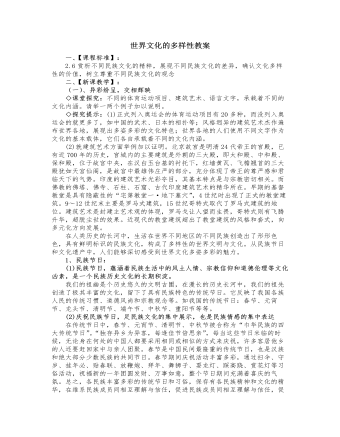
人教版高中政治必修3世界文化的多样性教案
代中国人民的四大发明,古希腊人的哲学与艺术成就,占代印度人民在宗教和数学方面的成就等,都以其鲜明的民族特色}:富J,世界文化,共同推动了人类社会的进步和发展。总之,尊重和保存不同的民族文化,是人类生存和发展的基础。◇课堂探究:(1)对那些面临失传的占老民族文化,有人反对进行抢救和保护,认为应当顺其自然地让它们被历史淘汰。你同意这种看法吗?(2)你认为,我们还有哪些独特的文化形式可以申报人类口述和非物质遗产?◇探究提示:(1)文化遗产是一个民族的“身份证”,从文化意义上标识出一个民族的个性和一个民族的历史记忆。文化遗产是人类社会发展的见证,是人类文明的重要载体。文化遗产体现着一个民族独特的思维方式和文化价值,是民族的根基,是历史的纪念碑。文化遗产既属于一个国家、一个民族,也是全人类的共同财富。文化遗产具有不可再生性的特点,所以对那些面临失传的古老民族文化,我们不能坐视不管,要进行及时有效地抢救和保护。
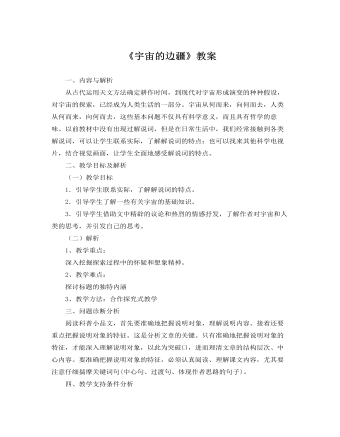
人教版高中语文必修3《宇宙的边疆》教案
一、内容与解析从古代运用天文方法确定耕作时间,到现代对宇宙形成演变的种种假设,对宇宙的探索,已经成为人类生活的一部分。宇宙从何而来,向何而去,人类从何而来,向何而去,这些基本问题不仅具有科学意义,而且具有哲学的意味。以前教材中没有出现过解说词,但是在日常生活中,我们经常接触到各类解说词,可以让学生联系实际,了解解说词的特点;也可以找来其他科学电视片,结合视觉画面,让学生全面地感受解说词的特点。二、教学目标及解析(一)教学目标1.引导学生联系实际,了解解说词的特点。2.引导学生了解一些有关宇宙的基础知识。3.引导学生借助文中精辟的议论和热烈的情感抒发,了解作者对宇宙和人类的思考,并引发自己的思考。
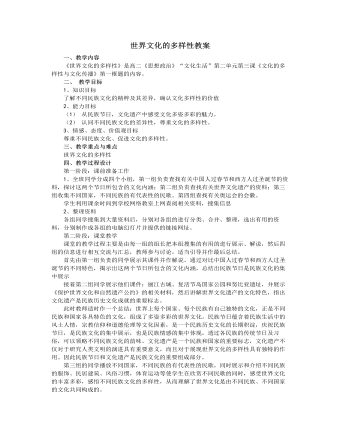
人教版高中政治必修3世界文化的多样性教案
五、课后反思课后组织学生讨论对本课的感受,同学们都非常乐意采取这种上课方式,既可以通过资料的搜集、整理提高自身信息采集的能力,也能够提高自己学习积极性,变枯燥为生动。本人在教学中也深深地感到:一方面,充分发挥学生的主体作用,有利于启发同学的思维,培养自主思考的能力。而充分利用网络的教学功能,将现代信息技术和学科教学很好地结合了起来。只有调动全体同学的积极性、主动性、创造性,我们的教学才能有生命力;另一方面,光有学生的活动也不行,虽然学生能够积极投入地利用互联网搜集并动手制作课件,在课堂交流中能很好地进行发散思维和创造性思维,但其集中思维和抽象性思维还存在一定的缺陷,主要体现在对搜集的材料的取舍是以及对知识点的归纳和深化方面,所以在充分发挥学生的主体作用的同时应该也必须重视教师主导作用的发挥,引导学生由形象到抽象、由发散到集中、由演绎到归纳的思维能力的逐步提高。
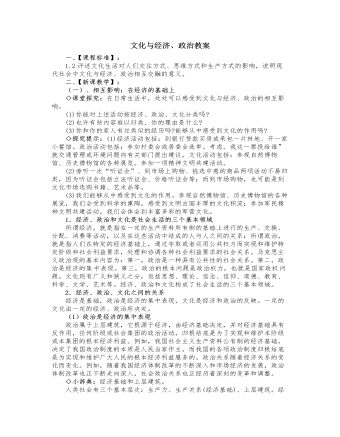
人教版高中政治必修3文化与经济、政治教案
另一方面,文化素质影响公民政治权利的行使。随着民主和法制建设的发展,人们为了参与政治生活,需要更高的文化素养。文化水平提高了,人们受到的教育、接受的信息就越多,活动的领域就越广,民主法制和权利意识就越强,这些都会影响人们的民主素质和民主水平,使人们更好地进行政治参与,行使民主权利。(2)文化与国际政治相互交融,成为当代国际政治斗争的重要内容。随着世界多极化的发展,奉行霸权主义的国家,借助文化渗透的方式,竭力推销自己的价值观念,企图削弱和取代别国的民族文化,以推行强权政治。这使世界范围内反对文化霸权主义的斗争,成为当代国际政治斗争的重要内容。文化已经成为进行政治斗争、国际斗争的重要形式之一。对文化市场的争夺不仅仅是争夺票房价值、争夺经济效益,更主要的是对受众对象的争夺,对受众注意力这种特殊的稀缺资源的占有,以及在此基础上对舆论的控制与引导。因此,失去文化市场就意味着失去政治优势,意味着政治影响力的边缘化乃至萎缩或丧失。这一点,从目前世界正在进行的空前规模的“文化战争”,可以看得非常清楚。
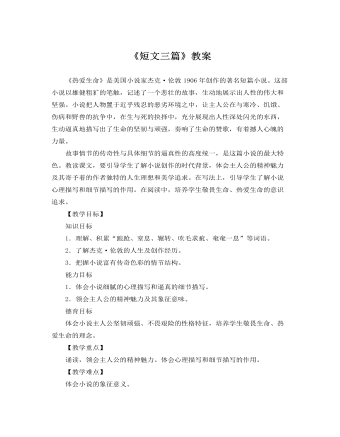
人教版高中语文必修4《短文三篇》教案
③于是,大自然出现了惊人的奇迹,不毛的石缝间丛生出倔强的生命。④或者就只是一簇一簇无名的野草,春绿秋黄。岁岁枯荣。它们只有三两片长长的细瘦的薄叶,那细微的叶脉,告知你生存该是多么艰难;更有的。它们就在一簇一簇瘦叶下自己生长出根须,只为了少向母体吮吸一点乳汁,便自去寻找那不易被觉察到的石缝。这就是生命,如果这是一种本能,那么它正说明生命的本能是多么尊贵,生命有权自认为辉煌壮丽,生机竟是这样地不可扼制。⑤或者就是一团一团小小的山花,大多又都是那苦苦的蒲公英。它们不似田野上的同宗长得那样茁壮,它们的茎显得坚韧而苍老。它们的叶因枯萎而失却光泽。它们已经不能再去为人们作佐餐的鲜嫩的野菜,却默默地为攀登山路的人准备了一个可靠的抓手。生命就这样地被环境规定着,又被环境改变着,适者生存的规律尽管无情。但一切适者就是战胜环境的强者。生命现象告诉你,生命就是拼搏。





















